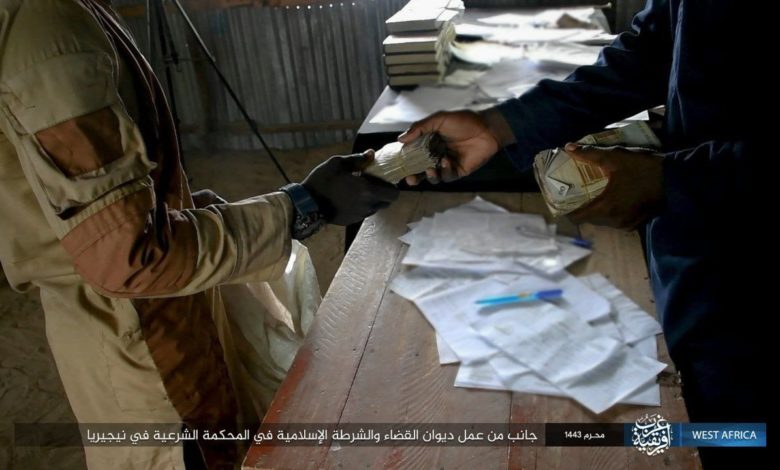ISWAP Collects Taxes In CFA As Nigeria Government Plans Currency Redesign
The Nigerian government’s proposed change to the design of three of its currency notes has caused a rush to deposit cash in banks. Even the insurgents have begun to review their monetary ‘policy’ by opting to take only CFA for all their transactions

The Islamic State West Africa Province (ISWAP) has ordered farmers and fishermen in the territories they control around Lake Chad to pay ‘taxes’ in CFA, in response to the Nigerian government’s planned redesign of its currency.
In October, the Central Bank of Nigeria announced a plan to change the look of three of the nation’s currency notes (N500, N200 and N100) by the end of Jan. 2023.
The disclosure took many by surprise and raised concern among many citizens, especially the short notice period allowed for people to change the notes. Making the announcement, Central Bank governor Godwin Emefiele said the change of notes would remove currency in the hands of terrorists from circulation. It would also target corrupt officials who had stocked cash in their homes with elections coming up early next year.
The government’s design change has caused many Nigerians to rush and deposit stores of cash in banks. Some businesses have also begun to minimise their cash transactions.
The alarm over the new notes is not only restricted to the law-abiding Nigerians. ISWAP has reviewed their own monetary policy, ordering all farmers and fishermen in the Lake Chad basin to stop transacting businesses in Naira and commence payment of all enforced taxes in a currency used in neighbouring countries.
“We cannot take or transact business with Naira notes now, because the Boko Haram commanders said they would only accept taxes and other farming and fishing levies in CFA,” said Bukar Ajilari, a fisherman in Baga.
CFA, also known as Central African CFA Franc, is the currency used by Cameroon, Chad, and Niger Republic, all countries sharing common borders with Nigeria.
Another source from one of the Lake Chad islands who pleaded not to be named in this report because he fears for his safety, said: “the ISWAP gunmen have blocked the routes leading to Lake Chad from Nigeria, forcing the returning fishermen and farmers to go through Cameroon or Chad so that they could get their Naira notes converted to CFA before they are allowed to access the ISWAP controlled territories.
Sources familiar with ISWAP operations confided in a HumAngle reporter that two commanders of the outlawed group in charge of collecting levies have been monitoring movements through the maze of islands in the lake, ensuring strict compliance.
“They have their checkpoint in Bulgaram, Doron Liman, Ramin Dorina, Hikka, and many villages in the Cameroon Republic; and they monitor to see if one complies with the directives or not.”
A local smoked fish vendor in Maiduguri fish Market, Dantala Buba, confirmed this development to HumAngle in a phone interview.
“One of the reasons fish became so expensive about two months ago was because the Boko Haram gunmen went and chased away the fishermen after they had returned to their communities,” he said.
“They not only chased the fishermen away, but they also killed many of our friends who risked going to fish there. It was later on that they began to persuade people to return and fish on condition that they pay about N2000 on each fishing expedition. Some people who agreed to the terms have returned there to fish; even though they still have to forfeit 20 per cent or whereabouts of either their catch or harvests.”
Now that insurgents have shifted to using CFA as their legal tender, fishermen pay as much as CFA 1,500 in tax for every fishing expedition.
Commenting on how this change of currency situation would impact the activities of the insurgents, top military personnel in Northeast Nigeria noted that “our intelligence units are on red alert to monitor and suspicious movement of cash around the Lake Chad region.”
The source, who preferred anonymous attribution in this report because he has no official clearance to speak on the matter, said: “Cash is one of the main oxygen that keeps this madness (violent conflict) going on, and this naira notes redesign comes as a masterstroke to stifle terrorism and every other money-driven criminality in this country.”
Support Our Journalism
There are millions of ordinary people affected by conflict in Africa whose stories are missing in the mainstream media. HumAngle is determined to tell those challenging and under-reported stories, hoping that the people impacted by these conflicts will find the safety and security they deserve.
To ensure that we continue to provide public service coverage, we have a small favour to ask you. We want you to be part of our journalistic endeavour by contributing a token to us.
Your donation will further promote a robust, free, and independent media.
Donate HereStay Closer To The Stories That Matter




